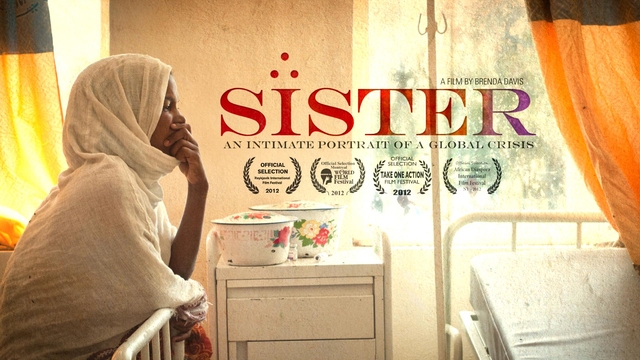Sister
The courageous warriors on the frontline of the battle against Third World deaths in childbirth
 Madam Bwa has never been trained, but she's delivered over 12,000 babies. She works on filthy floors and in crowded slums, while her mothers-to-be eat dirt to survive. From Ethiopia to Cambodia to Haiti, across the Third World life lies in fragile hands. In this beautiful doc the difficulties of childbirth are laid bare and the strategies to improve maternal health and mortality rates are explored with an affecting clarity. An intimate portrait of a global crisis.
Madam Bwa has never been trained, but she's delivered over 12,000 babies. She works on filthy floors and in crowded slums, while her mothers-to-be eat dirt to survive. From Ethiopia to Cambodia to Haiti, across the Third World life lies in fragile hands. In this beautiful doc the difficulties of childbirth are laid bare and the strategies to improve maternal health and mortality rates are explored with an affecting clarity. An intimate portrait of a global crisis.


 "Oh my luck! I'll lose my life... Save me, please God save my life...", a young patient in a rural hospital in Ethiopia whimpers. Her fear is very real in a country where 1 in 27 women die in childbirth-related deaths. "Is my baby alive?" She is scared, in pain and tired after labouring for 24 hours at home. Carried on a wooden stretcher for the four-hour trek to the hospital, when she finally arrives, her baby is dead.
Lack of education or investment in healthcare mean that Third World countries have an average maternal mortality rate of 1 in 40 women. In contrast, in the USA it is closer to 1 in 5,000. Behind the statistics there are some incredible people, like Madam Bwa, who are taking it upon themselves to try to change this terrible plight. In urban Haiti, she walks through "the most miserable part of the city" paying home visits to women who are starving, without clean water and "meanwhile, they are pregnant".
In Cambodia a woman in need of a caesarian section cannot afford the bus to the hospital. Another dies because her placenta does not deliver; she could not reach the hospital because there was no bridge. Local health officer Goitom asks his patient how her first child died. "Like this one" she replies, staring blankly, visibly crushed by the death of her second child. She was brought into the hospital with her baby's arm protruding from her vagina. She lives four hours by foot from the hospital. Time is everything; if it had been possible for her to come earlier, her baby could have been saved. If she had come later, she almost certainly would be dead.
"When a mother survives you feel great, delighted. But I think it's not enough. A single person can't solve all these problems." Goitom is frustrated, and with pregnancy and childbirth killing more people than AIDS, tuberculosis and malaria combined, rightly so. As this moving doc explores the unheard stories of three ordinary people struggling to diminish these unnecessary and tragic deaths, it is clear that what they lack in resources and formal training they make up for in bravery and determination. The result is intimate and emotional; a tribute to courageous self-sacrifice and a cry for help.
LEARN MORE.
"Oh my luck! I'll lose my life... Save me, please God save my life...", a young patient in a rural hospital in Ethiopia whimpers. Her fear is very real in a country where 1 in 27 women die in childbirth-related deaths. "Is my baby alive?" She is scared, in pain and tired after labouring for 24 hours at home. Carried on a wooden stretcher for the four-hour trek to the hospital, when she finally arrives, her baby is dead.
Lack of education or investment in healthcare mean that Third World countries have an average maternal mortality rate of 1 in 40 women. In contrast, in the USA it is closer to 1 in 5,000. Behind the statistics there are some incredible people, like Madam Bwa, who are taking it upon themselves to try to change this terrible plight. In urban Haiti, she walks through "the most miserable part of the city" paying home visits to women who are starving, without clean water and "meanwhile, they are pregnant".
In Cambodia a woman in need of a caesarian section cannot afford the bus to the hospital. Another dies because her placenta does not deliver; she could not reach the hospital because there was no bridge. Local health officer Goitom asks his patient how her first child died. "Like this one" she replies, staring blankly, visibly crushed by the death of her second child. She was brought into the hospital with her baby's arm protruding from her vagina. She lives four hours by foot from the hospital. Time is everything; if it had been possible for her to come earlier, her baby could have been saved. If she had come later, she almost certainly would be dead.
"When a mother survives you feel great, delighted. But I think it's not enough. A single person can't solve all these problems." Goitom is frustrated, and with pregnancy and childbirth killing more people than AIDS, tuberculosis and malaria combined, rightly so. As this moving doc explores the unheard stories of three ordinary people struggling to diminish these unnecessary and tragic deaths, it is clear that what they lack in resources and formal training they make up for in bravery and determination. The result is intimate and emotional; a tribute to courageous self-sacrifice and a cry for help.
LEARN MORE.
WATCH MORE.
JOIN THE DISCUSSION.
 Official Selection, Doxa International Film Festival, 2013
Official Selection, Doxa International Film Festival, 2013
 Official Selection, One World Human Rights Documentary Film Festival, 2013
Official Selection, One World Human Rights Documentary Film Festival, 2013
 Official Selection, Reykjavik International Film Festival, 2012
Official Selection, Reykjavik International Film Festival, 2012





